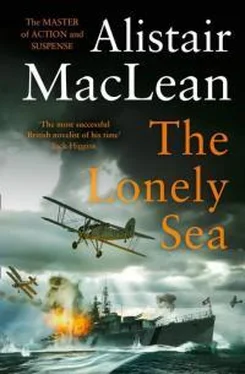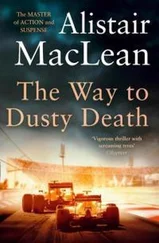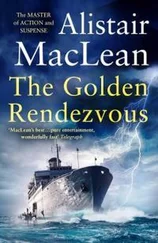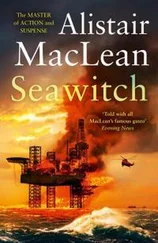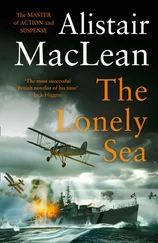‘Evening, Pete,’ he smiled. His torch reached across my seat, lit up Mary’s face. ‘Oh, hullo.’
‘Evening, George,’ I interrupted. ‘What’s all the cloak-and-dagger stuff for?’ I nodded at the policemen on their motor cycles, the truck across the road, felt the hairs on the back of my neck stand on end as I felt the pressure of Riordan’s silencer against the base of my spine. ‘Looking for our wandering boys, Riordan and Sellers?’
‘We are indeed,’ Wynne said grimly. ‘Suppose you’ve seen nothing, Pete.’
‘Sorry,’ I shrugged. ‘All quiet between here and Tarnmouth. I don’t envy you your job on a night like this.’
‘Me neither,’ Wynne said feelingly. ‘Wish I was up looking for a double-twenty in the “Horse and Plough”.’ We were both members of the local darts team. ‘See you up there tonight, perhaps, Pete?’
‘Perhaps, perhaps not.’ I shrugged and grinned, knowing that Riordan was watching every slightest change of my expression in the driving mirror. ‘There’s a dance on in Tarnmouth. May be the small hours before we…’ I broke off, put my arm round Mary’s shoulders and squeezed: she nestled her dark head against my shoulder. ‘Well, you know how it is, George.’
‘Yes.’ He took out his handkerchief, wiped some rain off his face and grinned back at me. ‘Married myself, but I know how it is. Be seeing you, Pete.’
‘Be seeing you.’ I waited till the truck had backed out of the way, let in the clutch and moved off. Riordan stirred in the darkness.
‘Not bad, Cartwright, not bad at all.’ His tone changed, became soft and menacing. ‘Why did you mention Tarnmouth, damn you?’
‘Don’t be such a bloody fool,’ I said wearily. ‘The only road out of Lipscombe leads there.’
We drove there in complete silence. I drove there in low gear most of the way, only once changing into top. It made for rather a noisy journey, but the low gear suited the road, the noise suited me. Every yard of the four miles I feared Riordan would order me to stop the Land Rover and take over himself: and then for Mary and myself there would only be the long sleep in the nearest ditch or behind the nearest convenient hedgerow. But the order to stop came only when we moved on to the Tarnmouth jetty.
‘Far enough,’ Riordan said harshly. He was almost there now, and the strain was beginning to tell, even on him. ‘Kill the motor.’
I put my foot on the clutch, slipped the gear lever silently into first, switched off the ignition key, placed my right hand across the telltale red ignition light, switched the ignition on again and waited. The handbrake was off.
‘Don’t move, either of you,’ Riordan warned. He was quite safe: the edge of the jetty was only 15ft away and deep water beyond. We couldn’t escape that way.
I stared in the rear mirror, saw the pale gleam of light as they lifted the screens above the tailgate, heard the metallic scuffle of a boot against the tailgate, and pressed the self-starter at the same instant.
Everything happened in a moment of time. The Land Rover jerked forward violently for a couple of feet before the engine stalled, Riordan and Sellers, swearing viciously, fell heavily to the ground behind, and the darkness and silence of the night was abruptly broken as two powerful headlights behind blazed into life at the same instant as clutches were let in and the twin cylinder engines of the powerful motor bikes caught with a throaty roar.
Riordan and Sellers had no chance. They were still struggling to their feet, blinded by the lights, when the motor bikes hit them: and before they could get up again four powerful policemen, piling out of the car immediately behind, had fallen on them with batons swinging.
‘Beautifully, done, Pete, beautifully done indeed.’ It was Sergeant Wynne talking, affecting not to notice the almost uncontrollable trembling of my arms and legs. ‘We’ll have that game of darts tonight yet – after a few pints. Tell me all.’
I told him, and at the end he turned to smile down coldly at a dazed and handcuffed Riordan.
‘Mr Cartwright here had a unique opportunity of studying that young lady’s engagement ring. He must have watched another ring being slipped on beside it, for practice like, at least 20 times before her wedding: and Mr Cartwright was the best man. It was hardly likely,’ Wynne finished drily, ‘that the Vicar’s wife was going to go out all night dancing with another man only 48 hours after her wedding.’
Postscript
Rewards and Responsibilities of Success
Some time in 1954 the Glasgow Herald ran a short story competition. I had no writing aspirations – I won’t say literary aspirations, for there are a considerable number of people who stoutly maintain that I never had and still don’t have any literary aspirations – and no hope.
However the hundred pounds first prize was a very considerable lure for a person who had no money at all. I went ahead and entered anyway, with a West Highland sea story carrying the title The ‘Dileas’. I won and was approached by Ian Chapman, the present chairman of Collins, the publishers, who asked me if I would write a novel. To everybody’s surprise, Collins remain my publishers still. After twenty-seven years.
During those twenty-seven years I have written twenty-seven books, fourteen screenplays, and numerous magazine and newspaper articles. It has been, and remains, a fair enough way of earning a living. I have been called a success, but ‘success’, in its most common usage, is a relative term which has to be applied with great caution, especially in writing.
Quantification is far from being all. Some of the most ‘successful’ books, magazines, and newspapers in publishing history have beggared description when one tries to describe the depths to which they have descended. Enlightenment may not be my forte but, then, neither is depravity.
It is difficult to say what effect one’s books have had, what degree of success or failure they have achieved. Consider, for instance, the reactions of those who had the debatable privilege of being on the Glasgow Herald’ s editorial board at the time when those short stories of long ago were under consideration.
Some may feel, or have felt, a mild degree of satisfaction that they had the foresight or acumen to pick on someone who was not to prove a total dud: all too many writers produce one story and then are heard of no more. Others on the board may have felt a profound indifference. Still others, gnashing their figurative teeth, may have rued the day they launched on his way, a writer whose style, they felt or feel, in no way matched the high standard set itself by Scotland’s premier newspaper. I shall never know.
The effect on the reading public is equally hard to gauge. I did write a couple of books which I thought might be judged as being meaningful or significant but from readers’ reactions I was left in no doubt that the only person who shared this opinion was myself. I should have listened to Sam Goldwyn’s dictum that messages are for Western Union.
I have since then concentrated on what I regarded as pure entertainment although I have discovered a considerable gulf may lie between what I regard as entertainment and others’ ideas on the subject.
I receive a fairly large mail and most of it is more than kindly in tone. I am aware that this does not necessarily reflect an overall consensus of approval: I am essentially a non-controversial writer and people who habitually sign themselves ‘Indignant’ or ‘Disgusted’ of Walthamstow or wherever, don’t read my books in the first place, or if they do, don’t find the contents worthy of disparaging comment.
The effects of writing on myself, of course, I know fairly well although I’m aware that, even here, there may be room for blind misappraisal. The main benefits of being a full-time writer are that they confer on one a marked degree of independence and freedom, but that freedom must never be misinterpreted as irresponsibility.
Читать дальше
